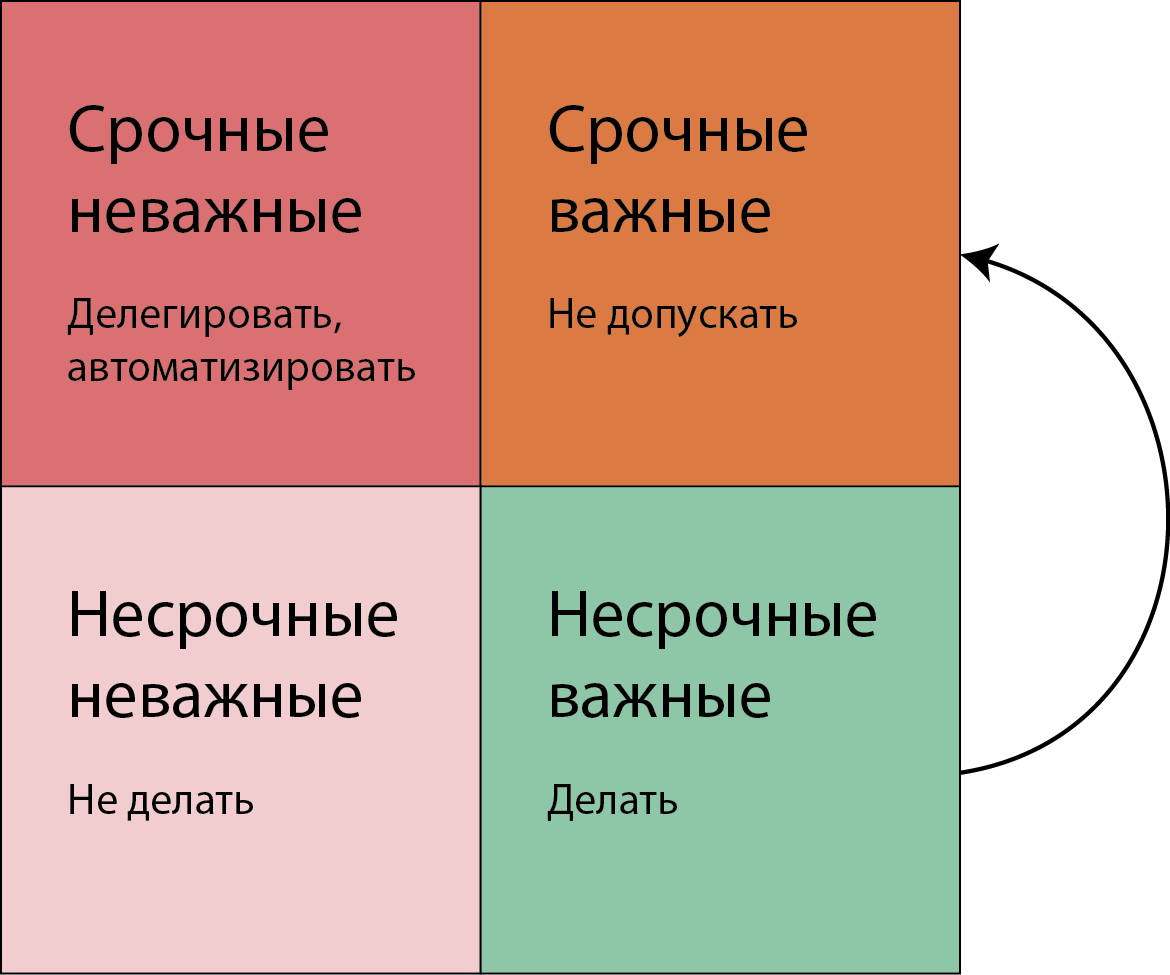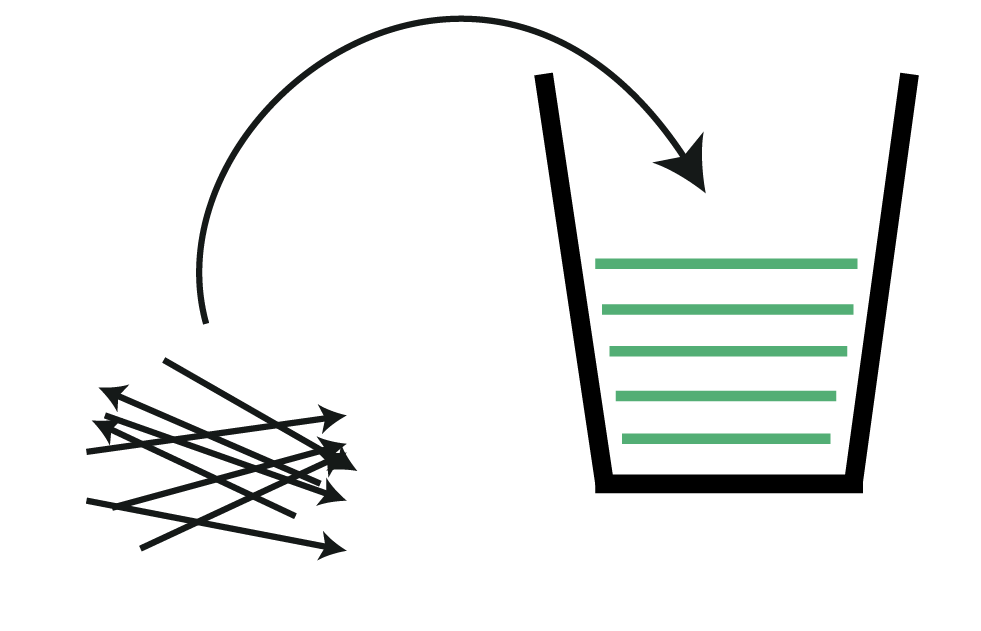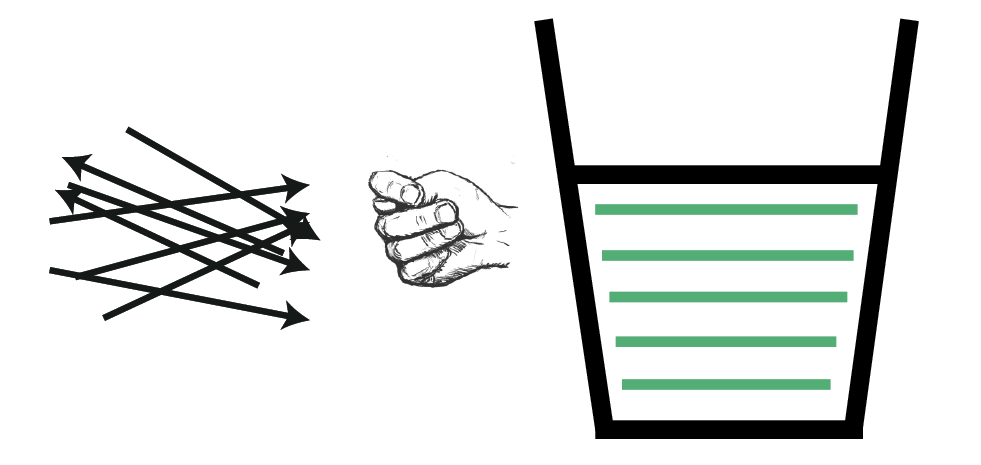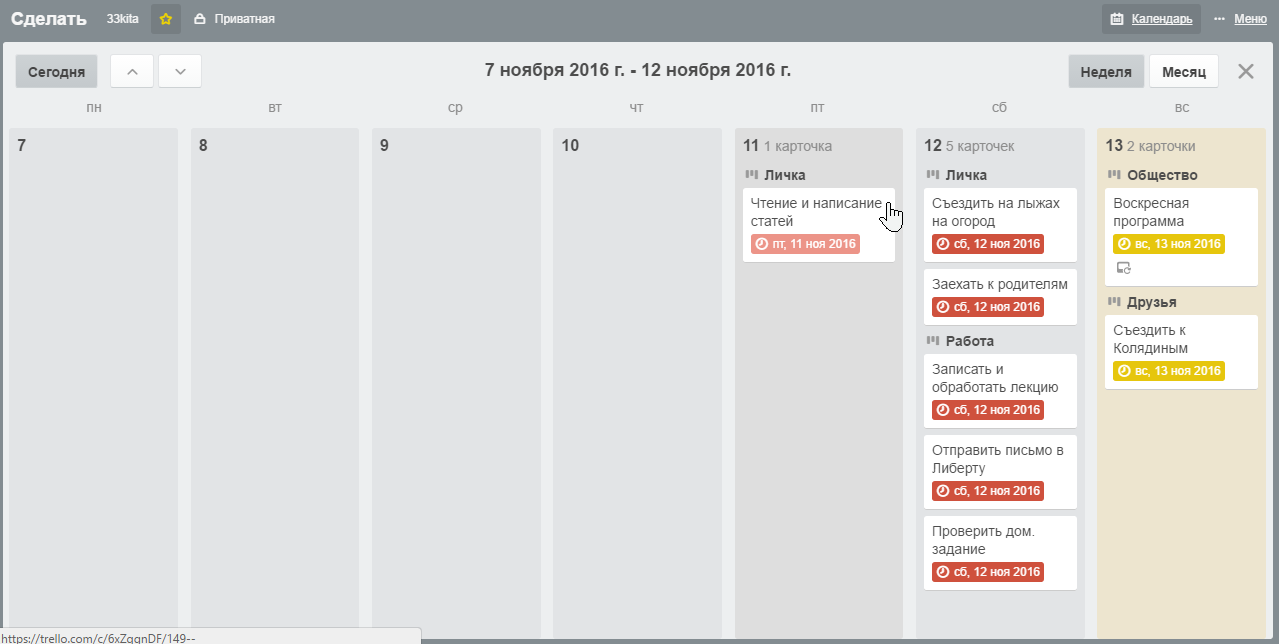To do tomorrow. How not to waste time on trifles
Let's talk a little about time management. They write a lot about this, but it just says that the topic is very popular and useful. The article combines the techniques of Stephen Covey and Mark Forster . These two techniques have proven incredibly useful and surprisingly effective. It will be useful to everyone who feels a blockage of business and does not have time to live.

An early morning is best for mental activity. Moreover, not just earlier, but very early: at 4 in the morning. In eastern philosophy, this time is called brahma-muhurta. Wise people from the east say that there are no owls: there are only wrong larks.
If you need to learn something or write something without being distracted by anything external, this is the right time. The mind at this time works very well and allows you to deal with the current initiative: learning languages, your own IT project, writing a book, etc.
What do you need to get up on time? The early rise begins in the evening and it consists of three points:
If you read Stephen Covey’s book about “7 Skills of Highly Effective People,” you may know that there are four types of cases that we have. They are divided according to two parameters: importance and urgency.

Unimportant things
Life can be wasted on trifles. For example, a relative calls you and says that he urgently needs to make an online store of Altai honey. This is unimportant and, in reality, an urgent matter. We don’t do such things. Feel free to refuse such offers.
You will receive a letter with an offer to undergo IQ testing with a 20% discount within three hours. The offer is limited. This applies to urgent and unimportant matters and you can not deal with them. It also includes the call of his wife with a request to urgently take her to work, because everything broke there. Delegate this business to a taxi driver.
When I worked a little in Business Lines, there the product manager daily executed an SQL query, saved it in a CSV file and sent it by mail. For this girl this task was not necessary and not important, but it was urgent. Looking at the picture, the solution suggests itself: to automate. And indeed, when this business was entrusted to me, in a few days I automated the whole process and more than that it did not distract me and was done through the Windows sheduler.
Things to do
Those who have a car are familiar with the situation when it breaks. In most cases, this is preceded by some signs. For example, pounded in the right wheel. We can not pay attention to it, or immediately go and fix it. At the initial stage, the matter of repairing the suspension is important and not urgent: the car drives and the speed does not affect the breakdown. However, sooner or later, this breakdown flows into a more serious one and blocks driving by car. The case is turning into an important and urgent one.
Another example: as a senior programmer, you can do everything yourself. The quality of the code is top notch and everything works fine. But at the same time, you will not be able to engage in truly interesting tasks. An important and urgent matter is to prepare a couple of young interns. If you do not do this, this will lead to the emergence of an important and urgent matter: to find a qualified person to support the project, because you need to deal with another, more responsible business.
The general rule is this: we do not do unimportant matters at all or delegate. We get rid of them as much as possible. Important and urgent we rake and do not allow their appearance. Important and non-urgent we do first. Allocate several hours a day to them. These include professional development, participation in raising children, family vacations, vacation and participation in public life.
A wonderful video with Steven Covey on this subject:
There is a book by Mark Forster, entitled "To it tomorrow." And the author says in it that the first thing to do is to stop and scoop up all the accumulated cases in one pile. Some of them can be omitted altogether, some can be delegated and some can be done on their own, if you can’t get rid of them. But the main task is to throw out as much as possible. While you are getting rid of accumulated cases, you are not accepting any new ones: take a day off, leave, disconnect the phone and rake everything.
When, as usual, some business flies to us, we tend to carry it out immediately. Or, if you don’t do it, then at least look at it carefully. A colleague threw the link into Skype and for five minutes we stuck. Aunt Asya arrived, showed a white powder and again we were not up to work. The wife calls and says that you really need to go to the parent meeting, because you need to align and line up the teachers so that they finally understand that your child is vegetarian.

Mark Forster says we need to make a buffer that will receive all the tasks. The buffer is called tomorrow. Whatever comes to you today, you are sending this case to the schedule of tomorrow (or not at all if it is not important). A colleague comes up and says that you need to send a report. - Okay tomorrow. My wife is calling, I need to buy tickets. - Yes, I'll buy it tomorrow. The client wants to change the contacts in the header of the site. - Tomorrow we will change everything.

Thus, your tasks are accumulated for tomorrow, and today you are engaged in those tasks that were planned yesterday. Sometimes it happens that tomorrow you will not have time to complete everything and the tasks will be transferred to the day after tomorrow, etc. This means that you are not doing your job. More about this later.
It should be strictly remembered that the to-do list for today is a closed list. If your day has already been planned, you don’t need to add anything there: write for tomorrow. Of course, there are times when something really happened and something needs to be done very urgently. Accident, tragedy, hurricane ... Here, of course, all the prioritization breaks down and you need to do what you need. But in general, the list for today should remain closed.

Can I send tasks to the day after tomorrow? Yes, of course you can. Just the minimum buffer is tomorrow. You may have tasks that need to be done on a certain day, this is quite normal.
Can I plan for a week? Stephen Covey says you can and should. How can this be compared with the Do it tomorrow system? —Plan the end of the week. One or two important things for each day of the week is enough. The rest will fly by themselves. If there are sufficient intervals between your weekly affairs, you can insert a couple more cases into the schedule for tomorrow without tension.
Forster introduces the concept of "ongoing initiative." This is what you do daily. For example, cut some useful project or practice Spanish. Most likely, you will not be able to set specific tasks for such projects and you just need to enter the item “Spanish language” in the plan. It will be repeated day after day and you will be pleased to mark it as done, and this, by the way, is a very pleasant incentive that supports the system.
If you have blockages even in the Covey-Forster system, then you are not doing your job. Here's how to distinguish your work from someone else's:
The tablet is here.
If I, as the head of the studio, start to draw icons or fill the client site with content, it will be harmful for the business. Of course, I can handle it, however, these are the tasks that can and should be delegated. This is not my job. Focus on tasks that only you can really do.
Technically, it’s easiest to write in a notebook. This is quite normal, but hard for me. The notebook should be carried with you, do not forget to write down in it and do not forget to look at it. So personally, it’s much more convenient for me to use a phone and a computer. My arsenal is this:

If someone has other good tools, please share in the comments. It is always very interesting. I can say that I also tried WeekPlan and Zendone, but settled on trello.
I think this is enough to live in peace and without rush. The technique does not claim to be the ultimate truth, however, it certainly works. The main thing to follow, and not just know about it.
Lyrics: Igor Talkov Jr. has a good song about time management.
All happiness and divine love)

Daily routine
An early morning is best for mental activity. Moreover, not just earlier, but very early: at 4 in the morning. In eastern philosophy, this time is called brahma-muhurta. Wise people from the east say that there are no owls: there are only wrong larks.
If you need to learn something or write something without being distracted by anything external, this is the right time. The mind at this time works very well and allows you to deal with the current initiative: learning languages, your own IT project, writing a book, etc.
What do you need to get up on time? The early rise begins in the evening and it consists of three points:
- do not overeat at night (especially cereals);
- plan tomorrow: what will you do in the morning and WHY do you get up;
- lie on time; what time is it individually, but 7 hours of sleep is usually enough.
What are we doing?
If you read Stephen Covey’s book about “7 Skills of Highly Effective People,” you may know that there are four types of cases that we have. They are divided according to two parameters: importance and urgency.

Unimportant things
Life can be wasted on trifles. For example, a relative calls you and says that he urgently needs to make an online store of Altai honey. This is unimportant and, in reality, an urgent matter. We don’t do such things. Feel free to refuse such offers.
You will receive a letter with an offer to undergo IQ testing with a 20% discount within three hours. The offer is limited. This applies to urgent and unimportant matters and you can not deal with them. It also includes the call of his wife with a request to urgently take her to work, because everything broke there. Delegate this business to a taxi driver.
When I worked a little in Business Lines, there the product manager daily executed an SQL query, saved it in a CSV file and sent it by mail. For this girl this task was not necessary and not important, but it was urgent. Looking at the picture, the solution suggests itself: to automate. And indeed, when this business was entrusted to me, in a few days I automated the whole process and more than that it did not distract me and was done through the Windows sheduler.
Things to do
Those who have a car are familiar with the situation when it breaks. In most cases, this is preceded by some signs. For example, pounded in the right wheel. We can not pay attention to it, or immediately go and fix it. At the initial stage, the matter of repairing the suspension is important and not urgent: the car drives and the speed does not affect the breakdown. However, sooner or later, this breakdown flows into a more serious one and blocks driving by car. The case is turning into an important and urgent one.
Another example: as a senior programmer, you can do everything yourself. The quality of the code is top notch and everything works fine. But at the same time, you will not be able to engage in truly interesting tasks. An important and urgent matter is to prepare a couple of young interns. If you do not do this, this will lead to the emergence of an important and urgent matter: to find a qualified person to support the project, because you need to deal with another, more responsible business.
The general rule is this: we do not do unimportant matters at all or delegate. We get rid of them as much as possible. Important and urgent we rake and do not allow their appearance. Important and non-urgent we do first. Allocate several hours a day to them. These include professional development, participation in raising children, family vacations, vacation and participation in public life.
A wonderful video with Steven Covey on this subject:
How to get rid of small things?
There is a book by Mark Forster, entitled "To it tomorrow." And the author says in it that the first thing to do is to stop and scoop up all the accumulated cases in one pile. Some of them can be omitted altogether, some can be delegated and some can be done on their own, if you can’t get rid of them. But the main task is to throw out as much as possible. While you are getting rid of accumulated cases, you are not accepting any new ones: take a day off, leave, disconnect the phone and rake everything.
Buffer: do tomorrow
When, as usual, some business flies to us, we tend to carry it out immediately. Or, if you don’t do it, then at least look at it carefully. A colleague threw the link into Skype and for five minutes we stuck. Aunt Asya arrived, showed a white powder and again we were not up to work. The wife calls and says that you really need to go to the parent meeting, because you need to align and line up the teachers so that they finally understand that your child is vegetarian.

Mark Forster says we need to make a buffer that will receive all the tasks. The buffer is called tomorrow. Whatever comes to you today, you are sending this case to the schedule of tomorrow (or not at all if it is not important). A colleague comes up and says that you need to send a report. - Okay tomorrow. My wife is calling, I need to buy tickets. - Yes, I'll buy it tomorrow. The client wants to change the contacts in the header of the site. - Tomorrow we will change everything.

Thus, your tasks are accumulated for tomorrow, and today you are engaged in those tasks that were planned yesterday. Sometimes it happens that tomorrow you will not have time to complete everything and the tasks will be transferred to the day after tomorrow, etc. This means that you are not doing your job. More about this later.
It should be strictly remembered that the to-do list for today is a closed list. If your day has already been planned, you don’t need to add anything there: write for tomorrow. Of course, there are times when something really happened and something needs to be done very urgently. Accident, tragedy, hurricane ... Here, of course, all the prioritization breaks down and you need to do what you need. But in general, the list for today should remain closed.

Can I send tasks to the day after tomorrow? Yes, of course you can. Just the minimum buffer is tomorrow. You may have tasks that need to be done on a certain day, this is quite normal.
Can I plan for a week? Stephen Covey says you can and should. How can this be compared with the Do it tomorrow system? —Plan the end of the week. One or two important things for each day of the week is enough. The rest will fly by themselves. If there are sufficient intervals between your weekly affairs, you can insert a couple more cases into the schedule for tomorrow without tension.
Ongoing initiative
Forster introduces the concept of "ongoing initiative." This is what you do daily. For example, cut some useful project or practice Spanish. Most likely, you will not be able to set specific tasks for such projects and you just need to enter the item “Spanish language” in the plan. It will be repeated day after day and you will be pleased to mark it as done, and this, by the way, is a very pleasant incentive that supports the system.
Own and another's work
If you have blockages even in the Covey-Forster system, then you are not doing your job. Here's how to distinguish your work from someone else's:
| Own work | Someone else's work |
|---|---|
| Moves your business or career forward | Distract from the tasks that move your business or career forward |
| The one you get paid for | The one for which you are not paid |
| It brings significant benefits | Not noticeable benefit |
| Uses your skills to the fullest | Uses your skills at half power |
| Moves out of your comfort zone. | Leaves in comfort zone |
| Is challenging | Simple |
| The one that only you can do | One that anyone can do |
If I, as the head of the studio, start to draw icons or fill the client site with content, it will be harmful for the business. Of course, I can handle it, however, these are the tasks that can and should be delegated. This is not my job. Focus on tasks that only you can really do.
Instruments
Technically, it’s easiest to write in a notebook. This is quite normal, but hard for me. The notebook should be carried with you, do not forget to write down in it and do not forget to look at it. So personally, it’s much more convenient for me to use a phone and a computer. My arsenal is this:
- Google calendar for specific times. There are meetings, events, going to the cinema, birthdays, etc.
- Trello I created a board, connected a calendar to it and in the calendar I plan things for tomorrow. Additionally, cases are grouped into sections: personal, work, society, friends. Everything as Stephen Covey bequeathed.

If someone has other good tools, please share in the comments. It is always very interesting. I can say that I also tried WeekPlan and Zendone, but settled on trello.
I think this is enough to live in peace and without rush. The technique does not claim to be the ultimate truth, however, it certainly works. The main thing to follow, and not just know about it.
Lyrics: Igor Talkov Jr. has a good song about time management.
All happiness and divine love)
